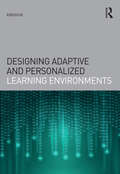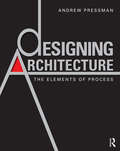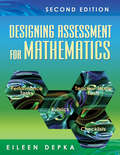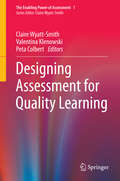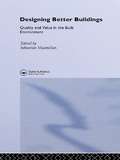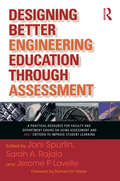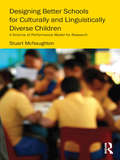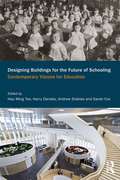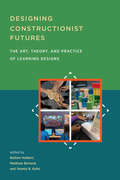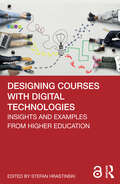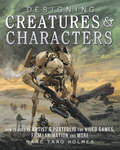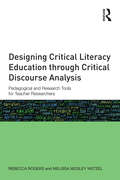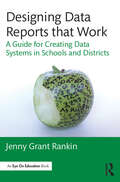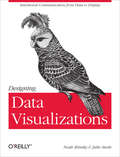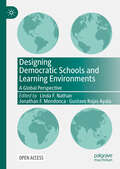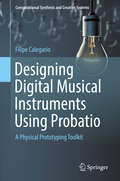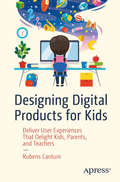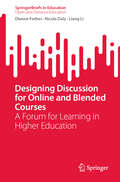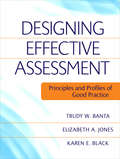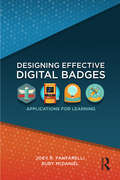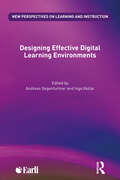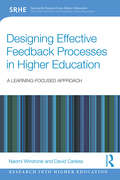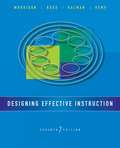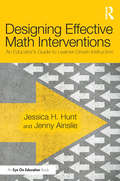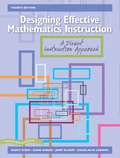- Table View
- List View
Designing Adaptive and Personalized Learning Environments (Interdisciplinary Approaches to Educational Technology)
by KinshukDesigning Adaptive and Personalized Learning Environments provides a theoretically-based yet practical guide to systematic design processes for learning environments that provide automatic customization of learning and instruction. The book consists of four main sections: In "Introduction and Overview," the concepts of adaptivity and personalization are introduced and explored in detail. In "Theoretical Perspectives with Example Applications," various theoretical concepts underlying adaptive and personalized learning are discussed, including cognitive profiling, content-based adaptivity, exploration-based adaptivity, and mobile and ubiquitous settings. In "Practical Perspectives with Example Applications," the implementation process for adaptive and personalized learning environments is described, followed by application in various contexts. In "Validation and Future Trends," various evaluation techniques for validating the efficiency and efficacy of adaptive and personalized learning systems are discussed. This final section concludes with a discussion of emerging trends in adaptive and personalized learning research. Based on cutting-edge research, Designing Adaptive and Personalized Learning Environments is appropriate as a primary textbook for both undergraduate and graduate courses focused on the design of learning systems, and as a secondary textbook for a variety of courses in programs such as educational technology, instructional design, learning sciences, digital literacy, computer based systems, and STEM content fields.
Designing Architecture: The Elements of Process
by Andrew PressmanDesigning Architecture is an indispensable tool to assist both students and young architects in formulating an idea, transforming it into a building, and making effective design decisions. This book promotes integrative and critical thinking in the preliminary design of buildings to inspire creativity, innovation, and design excellence. This compendium of individual wisdom and collective experience offers explicit guidance to students and young professionals on how to approach, analyze, and execute specific tasks; develop and refine a process to facilitate the best possible design projects; and create meaningful architectural form. Here the design process – from orchestrating client participation to finalizing schematic design – is explored and illuminated. The following material is presented to make the book a useful didactic tool for professional development: explicit strategies for doing design rather than simply reviewing principles and precedents creative ideas in approaching and framing problems in design terms specific methods to translate ideas to culturally significant, socially responsive, and environmentally sensitive buildings techniques to integrate all levels of cognition from analysis to epiphany counsel on developing a personalized process for engaging design projects case studies augment the text and chronicle fascinating applications of the design process. The essence of this book lies in an integrated and holistic approach to each unique project as well as fostering curiosity and exploration – a departure from algorithms, easy generalities, or a formula for design. Designing Architecture will inspire readers to elevate the quality of preliminary designs and unravel some of the mystery of creating the most beautiful, responsive, and responsible architectural design possible.
Designing Assessment for Mathematics
by Eileen M. DepkaThis updated edition provides strategies for deepening students' understanding of math concepts, involving students in standards-based rubric development, and using rubric data to improve instruction.
Designing Assessment for Quality Learning
by Claire Wyatt-Smith Valentina Klenowski Peta ColbertThis book brings together internationally recognised scholars with an interest in how to use the power of assessment to improve student learning and to engage with accountability priorities at both national and global levels. It includes distinguished writers who have worked together for some two decades to shift the assessment paradigm from a dominant focus on assessment as measurement towards assessment as central to efforts to improve learning. These writers have worked with the teaching profession and, in so doing, have researched and generated key insights into different ways of understanding assessment and its relationship to learning. The volume contributes to the theorising of assessment in contexts characterised by heightened accountability requirements and constant change. The book's structure and content reflect already significant and growing international interest in assessment as contextualised practice, as well as theories of learning and teaching that underpin and drive particular assessment approaches. Learning theories and practices, assessment literacies, teachers' responsibilities in assessment, the role of leadership, and assessment futures are the organisers within the book's structure and content. The contributors to this book have in common the view that quality assessment, and quality learning and teaching are integrally related. Another shared view is that the alignment of assessment with curriculum, teaching and learning is linchpin to efforts to improve both learning opportunities and outcomes for all. Essentially, the book presents new perspectives on the enabling power of assessment. In so doing, the writers recognise that validity and reliability - the traditional canons of assessment - remain foundational and therefore necessary. However, they are not of themselves sufficient for quality education. The book argues that assessment needs to be radically reconsidered in the context of unprecedented societal change. Increasingly, communities are segregating more by wealth, with clear signs of social, political, economic and environmental instability. These changes raise important issues relating to ethics and equity, taken to be core dimensions in enabling the power of assessment to contribute to quality learning for all. This book offers readers new knowledge about how assessment can be used to re/engage learners across all phases of education.
Designing Better Building: Quality And Value In The Built Environment
by Sebastian MacmillanDesign is widely recognised as the key to improving the quality of the built environment. This well-illustrated book comprises 15 chapters written by leading practitioners, clients, academics and other experts, and presents the latest thinking on what design quality is and how to achieve it. For design practitioners and their clients alike, the book provides evidence to justify greater focus on, and investment in, design. It summarises the benefits that arise from good design - such as, civic pride in the urban environment, the stimulation of urban regeneration, corporate identity, occupant productivity and health in offices, improved learning outcomes in schools, better patient recovery rates in hospitals, as well as reduced environmental impact. And it illustrates these benefits through case study examples. Eight chapters focus on case studies of exemplary buildings in particular sectors - offices, schools, housing, and hospitals - and explain why and how they came to be designed, and the design qualities they exhibit.
Designing Better Engineering Education Through Assessment: A Practical Resource for Faculty and Department Chairs on Using Assessment and ABET Criteria to Improve Student Learning
by Richard M. Felder Jerome P. Lavelle Sarah A. Rajala Joni E. SpurlinThis book is written for engineering faculty and department chairs as a practical guide to improving the assessment processes for undergraduate and graduate engineering education in the service of improved student learning. It is written by engineering faculty and assessment professionals who have many years of experience in assessment of engineering education and of working with engineering faculty. The book reflects the emphasis placed on student outcomes assessment by ABET, Inc., the organization that accredits most U.S. engineering, computer science and technology programs, as well as providing substantial equivalency evaluations to international engineering programs. The book begins with a brief overview of assessment theory and introduces readers to key assessment resources. It illustrates–through practical examples that reflect a wide range of engineering disciplines and practices at both large and small institutions, and along the continuum of students’ experience, from first year to capstone engineering courses through to the dissertation–how to go about applying formative and summative assessment practices to improve student learning at the course and program levels. For most institutions, assessment of graduate education is new; therefore, there are readers who will be particularly interested in the chapters and examples related to graduate education. This book concludes with a vision for the future of assessment for engineering education. The authors cover five basic themes:· Use of assessment to improve student learning and educational programs at both undergraduate and graduate levels· Understanding and applying ABET criteria to accomplish differing program and institutional missions· Illustration of evaluation/assessment activities that can assist faculty in improving undergraduate and graduate courses and programs· Description of tools and methods that have been demonstrated to improve the quality of degree programs and maintain accreditation· Identification of methods for overcoming institutional barriers and challenges to implementing assessment initiatives.
Designing Better Schools for Culturally and Linguistically Diverse Children: A Science of Performance Model for Research
by Stuart McNaughtonHow can schools be better designed to enable equitable academic outcomes for culturally and linguistically diverse children from communities lacking in economic, political and social power? Putting forward a robust ‘science of performance’ model of school change based on a specified process of research and development in local contexts, this book: lays out the traditions of optimism and pessimism about effective schooling for at-risk students reviews the international and national evidence for the effectiveness of schools and school systems in reducing disparities in achievement describes the challenges educational research must address to solve the problem of school effectiveness, proposes strict criteria against which effectiveness should be judged, and examines in detail examples where change has been demonstrated proposes how researchers, professionals, and policy-makers can develop more effective systems. Bringing together structural and psychological accounts of the nature of schools, and establishing theoretically defensible criteria for judging effectiveness, this book is a critically important contribution to advancing the science of making schools more effective.
Designing Buildings for the Future of Schooling: Contemporary Visions for Education
by Harry Daniels Andrew Stables Hau Ming Tse Sarah CoxBringing together leading experts from the fields of architecture, design, engineering, education and the social sciences, this valuable collection presents a multidimensional understanding of the complexities and ways in which school designs influence and are influenced by educational practice. Moving beyond the long-debated question as to whether the design of a school influences pedagogic practice, chapters acknowledge the multiple and diverse ways in which teaching, learning, development and inclusion are impacted by the nature and quality of the physical environment. Considering changes in national and international policy, and exploring the changing pressures and demands on design, education and schooling more broadly, contributors rethink and re-envision those aspects of design and educational practice in which they specialise. Together, these chapters present a bold vision for the future conceptualisation, development and use of school buildings and facilities. An important contribution to debates on school design and education, inclusion and pedagogy, this is an essential and fascinating read for students, researchers, lecturers and policymakers involved in the fields of education and architecture.
Designing Constructionist Futures: The Art, Theory, and Practice of Learning Designs
by Nathan Holbert, Matthew Berland, and Yasmin B. KafaiA diverse group of scholars redefine constructionism--introduced by Seymour Papert in 1980--in light of new technologies and theories.Constructionism, first introduced by Seymour Papert in 1980, is a framework for learning to understand something by making an artifact for and with other people. A core goal of constructionists is to respect learners as creators, to enable them to engage in making meaning for themselves through construction, and to do this by democratizing access to the world's most creative and powerful tools. In this volume, an international and diverse group of scholars examine, reconstruct, and evolve the constructionist paradigm in light of new technologies and theories.
Designing Courses with Digital Technologies: Insights and Examples from Higher Education
by Stefan HrastinskiDesigning Courses with Digital Technologies offers guidance for higher education instructors integrating digital technologies into their teaching, assessment and overall support of students. Written by and for instructors from a variety of disciplines, this book presents evaluations that the contributors have implemented in real-life courses, spanning blended and distance learning, flipped classrooms, collaborative technologies, video-supported learning and beyond. Chapter authors contextualize their approaches beyond simple how-tos, exploring both the research foundations and professional experiences that have informed their use of digital tools while reflecting on their successes, challenges and ideas for future development.
Designing Creatures and Characters: How to Build an Artist's Portfolio for Video Games, Film, Animation and More
by Marc Taro HolmesAll You Need Is a Pencil, Paper and Your Imagination! Ever wondered how you could become a character designer for video games, film or animation? Veteran art director and concept artist Marc Taro Holmes shares proven methods for honing the skills and building the portfolio necessary to become a pro gaming artist. This is the first and only work-at-your-own pace home study program that teaches the crucial insider knowledge needed to break into the entertainment-design industry and develop your own style--all you need are a pencil, paper and your imagination. The projects within this straightforward guide are constructed to help you apply your existing drawing and digital art skills to character design. Or, if you're still working on your skills, it will help you improve while at the same time turning your mind into an idea-generating machine. Unlock the Secrets to Character and Creature DesignFollow the creature design process from start to finish: 35 projects are divided into 4 challenge levels, ranging from brainstorming and drawing character blueprints to completing market-ready illustrations. As the levels advance, the projects become more complex.Learn to solve design problems: Every project introduces you to an open-ended fictional assignment inspired by industry experience. Each project has a list of minimum deliverables--the basics to get to the next stage--plus bonus goals. You receive virtual merit badges for each achievement you complete.Think like a pro: Over the 155 possible artistic achievements, you'll be asked to find a solution to every type of conceptual problem you might encounter as a professional creature or character designer.Build your portfolio: Work toward creating an outstanding portfolio. Improve your skills and push yourself to create a fine-tuned presentation that could get you your eventual dream job."This is a workout for the imagination, a boot camp for creativity." --Marc Taro Holmes
Designing Critical Literacy Education through Critical Discourse Analysis: Pedagogical and Research Tools for Teacher-Researchers
by Rebecca Rogers Melissa Mosley WetzelUniquely bringing together discourse analysis, critical literacy, and teacher research, this book invites teacher educators, literacy researchers, and discourse analysts to consider how discourse analysis can be used to foster critical literacy education. It is both a guide for conducting critical discourse analysis and a look at how the authors, alongside their teacher education students, used the tools of discourse analysis to inquire into, critique, and design critical literacy practices. Through an intimate look at the workings of a university teacher education course and the discourse analysis tools that teacher-researchers use to understand their classrooms, the book provides examples of both pre-service teachers and teacher educators becoming critically literate. The context-rich examples highlight the ways in which discourse analysis aids teachers’ decision making in the moment and reflections on their practice over time. Readers learn to conduct discourse analysis as they read about critical literacy practices at the university level. Designed to be interactive, each chapter features step-by-step procedures for conducting each kind of discourse analysis (narrative, critically oriented, multimodal), sample analyses, and additional readings and resources. By attending to the micro-interactions as well as processes that unfold across time, the book illustrates the power and potential of discourse analysis as a pedagogical and research tool.
Designing Data Reports that Work: A Guide for Creating Data Systems in Schools and Districts
by Jenny Grant RankinDesigning Data Reports that Work provides research-based best practices for constructing effective data systems in schools and for designing reports that are relevant, necessary, and easily understood. Clear and coherent data systems and data reports significantly improve educators’ data use and save educators time and frustration. The strategies in this book will help those responsible for designing education data reports—including school leaders, administrators, and educational technology vendors—to create productive data reports individualized for each school or district. This book breaks down the key concepts in creating and implementing data systems, ensuring that you are a better partner with teachers and staff so they can work with and use data correctly and improve teaching and learning.
Designing Data Visualizations: Representing Informational Relationships
by Noah Iliinsky Julie SteeleData visualization is an efficient and effective medium for communicating large amounts of information, but the design process can often seem like an unexplainable creative endeavor. This concise book aims to demystify the design process by showing you how to use a linear decision-making process to encode your information visually.Delve into different kinds of visualization, including infographics and visual art, and explore the influences at work in each one. Then learn how to apply these concepts to your design process.Learn data visualization classifications, including explanatory, exploratory, and hybridDiscover how three fundamental influences—the designer, the reader, and the data—shape what you createLearn how to describe the specific goal of your visualization and identify the supporting dataDecide the spatial position of your visual entities with axesEncode the various dimensions of your data with appropriate visual properties, such as shape and colorSee visualization best practices and suggestions for encoding various specific data types
Designing Democratic Schools and Learning Environments: A Global Perspective
by Linda F. Nathan Jonathan F. Mendonca Gustavo Rojas AyalaThis open access book explores democratic schools and learning environments globally. The book focuses on a newly developed framework for democratic education. The authors describe existing schools and concept schools—those that are ideas but not in operation. The first section includes the editors’ own journeys Pillar One includes schools that emphasize the open flow of ideas and choices, regardless of their popularity. Pillar 2 maintains that it is impossible to have a high quality education that ignores equity. Chapters explore how many diverse ‘marginalized’ communities experience education and some innovations that hold great promise for inclusion. Pillar 3 provides examples of schools where active engagement, consensus and compromise support the ‘common good.’ Pillar 4 investigates schools which organize students, parents, social institutions and the larger community collaboratively to achieve its goals and to solve theirs and society’s most urgent challenges.
Designing Digital Musical Instruments Using Probatio: A Physical Prototyping Toolkit (Computational Synthesis and Creative Systems)
by Filipe CalegarioThe author presents Probatio, a toolkit for building functional DMI (digital musical instruments) prototypes, artifacts in which gestural control and sound production are physically decoupled but digitally mapped. He uses the concept of instrumental inheritance, the application of gestural and/or structural components of existing instruments to generate ideas for new instruments. To support analysis and combination, he then leverages a traditional design method, the morphological chart, in which existing artifacts are split into parts, presented in a visual form and then recombined to produce new ideas. And finally he integrates the concept and the method in a concrete object, a physical prototyping toolkit for building functional DMI prototypes: Probatio. The author's evaluation of this modular system shows it reduces the time required to develop functional prototypes. The book is useful for researchers, practitioners, and graduate students in the areas of musical creativity and human-computer interaction, in particular those engaged in generating, communicating, and testing ideas in complex design spaces.
Designing Digital Products for Kids: Deliver User Experiences That Delight Kids, Parents, and Teachers
by Rubens CantuniChildhood learning is now more screen-based than ever before, and app developers are flocking in droves to this lucrative and exciting market. The younger generation deserves the best, and growing up in a digital world has made them discerning and demanding customers. Creating a valuable user experience for a child is as complex and involved as when designing a typical app for an adult, if not more, and Designing Digital Products for Kids is here to be your guide. Author and designer Rubens Cantuni recognizes the societal importance of a high-quality and ethical app experience for children. There is room for significant improvement in this space, and Cantuni helps you optimize it. Designing Digital Products for Kids walks hopeful developers through digital product design—including research, concept, design, release, marketing, testing, analyzing, and iterating—all while aiming to build specifically for children. Industry experts and their real-world advice are showcased in this book, along with careful advice for the ethics that go along with this unique market. These tips include complex needs regarding mental development, accessibility, conscious screen time limits, and content sensitivity. Children, parents, and teachers alike are hungry for more thoughtful players in the kids’ app space, and Designing Digital Products for Kids is your ticket to successfully developing and educating for the future. What You Will LearnDesign platforms specifically for children, to entertain and educate themWork with a complex audience of parents, teachers and kidsUnderstand how different monetization strategies work in this industry and why Who This Book Is ForUser experience designers, UI designers, product owners, teachers and educators, startup founders. The range of topics is so wide that anyone interested or involved in digital products could find something interesting to learn.
Designing Discussion for Online and Blended Courses: A Forum for Learning in Higher Education (SpringerBriefs in Education)
by Liang Li Dianne Forbes Nicola DalyThis book supports teaching and learning through online discussion in higher education contexts such as universities, colleges, and polytechnics. It presents an explicit focus on popular asynchronous discussion tools and methods, with attention to disciplinary variety and key principles for successful learning-oriented discussion. It tackles the challenges faced by tertiary teachers implementing online discussion, and outlines common concerns and productive solutions to enhance the effectiveness and manageability of online discussions for teachers. This book also presents a parallel focus on the difficulties commonly experienced by students learning through online discussion. It offers advice for new online learners in a practical and accessible way, and considers assessment issues related to online discussion. Finally, this book offers innovative ideas for future-oriented online discussion in the higher education context.
Designing Effective Assessment
by Trudy W. Banta Karen E. Black Elizabeth A. JonesFifteen years ago Trudy Banta and her colleagues surveyed the national landscape for the campus examples that were published in the classic work Assessment in Practice. Since then, significant advances have occurred, including the use of technology to organize and manage the assessment process and increased reliance on assessment findings to make key decisions aimed at enhancing student learning. Trudy Banta, Elizabeth Jones, and Karen Black offer 49 detailed current examples of good practice in planning, implementing, and sustaining assessment that are practical and ready to apply in new settings. This important resource can help educators put in place an effective process for determining what works and which improvements will have the most impact in improving curriculum, methods of instruction, and student services on college and university campuses.
Designing Effective Digital Badges: Applications for Learning
by Joey R. Fanfarelli Rudy McDanielDesigning Effective Digital Badges is a hands-on guide to the principles, implementation, and assessment of digital badging systems. Informed by the fundamental concepts and research-based characteristics of effective badge design, this book uses real-world examples to convey the advantages and challenges of badging and showcase its application across a variety of contexts. Professionals in education, game development, mobile app development, and beyond will find strategies for practices such as credentialing, goal-setting, and motivation of their students.
Designing Effective Digital Learning Environments (New Perspectives on Learning and Instruction)
by Andreas Gegenfurtner Ingo KollarBringing together the research of leading international scholars in the field of digital learning, Designing Effective Digital Learning Environments discusses cutting-edge advancements in digital technology and presents an evidence-informed summary of best practices for effective design principles and implementation within educational settings.Readers will benefit from a synthesis of research evidence from previous meta-analyses on how to design digital environments that support learning, motivation, and collaboration. Divided into eight thematic parts, chapters unpack: An introduction to the design of digital learning environments Learning with multimedia, with particular emphasis on digital reading comprehension environments and GeoGebra software Digital videos for learning, including dynamic visualizations, instructional videos, and eye movement modeling examples Simulated realities, including learning with pedagogical agents and immersive virtual reality environments Game-based and sensor-based learning in digital environments Digital learning in social contexts, including a discussion of CSCL, social media, and audience response systems Design of digital classrooms, including flipped classroom approaches and synchronous online learning A concluding section discussing the efficacy and design of digital learning environments This edited volume is an essential read for any scholar, researcher, Ph.D., or Masters student working in the field of digital learning.
Designing Effective Feedback Processes in Higher Education: A Learning-Focused Approach (Research into Higher Education)
by David Carless Naomi WinstoneFeedback is one of the most powerful influences on student achievement, yet it is difficult to implement productively within the constraints of a mass higher education system. Designing Effective Feedback Processes in Higher Education: A Learning-Focused Approach addresses the challenges of developing effective feedback processes in higher education, combining theory and practice to equip and empower educators. It places less emphasis on what teachers do in terms of providing commentary, and more emphasis on how students generate, make sense of, and use feedback for ongoing improvement. Including discussions on promoting student engagement with feedback, technology-enabled feedback, and effective peer feedback, this book: Contributes to the theory and practice of feedback in higher education by showcasing new paradigm feedback thinking focused on dialogue and student uptake Synthesises the evidence for effective feedback practice Provides contextualised examples of successful innovative feedback designs analysed in relation to relevant literature Highlights the importance of staff and student feedback literacy in developing productive feedback partnerships Supports higher education teachers in further developing their feedback practice. Designing Effective Feedback Processes in Higher Education: A Learning-Focused Approach contributes to the theory and practice of higher education pedagogy by re-evaluating how feedback processes are designed and managed. It is a must-read for educators, researchers, and academic developers in higher education who will benefit from a guide to feedback research and practice that addresses well recognised challenges in relation to assessment and feedback.
Designing Effective Instruction
by Steven M. Ross Gary R. Morrison Jerrold E. Kemp Howard K. KalmanThis book includes many new, enhanced features and content. Overall, the text integrates two success stories of practicing instructional designers with a focus on the process of instructional design. The text includes stories of a relatively new designer and another with eight to ten years of experience, weaving their scenarios into the chapter narrative. Throughout the book, there are updated citations, content, and information, as well as more discussions on learning styles, examples of cognitive procedure, and explanations on sequencing from cognitive load theory.
Designing Effective Math Interventions: An Educator's Guide to Learner-Driven Instruction
by Jessica H. Hunt Jenny AinslieDesign effective, learner-driven math interventions with this accessible and thought-provoking guidebook. Learn how to set up instruction to promote participation and understanding, plan purposeful, targeted tasks, develop student thinking, and create tools to assess student work in a way that measures learning, not just performance. Chapters explore questions that educators frequently struggle with when designing interventions, offering user-friendly research and evidence-based strategies to help overcome common hurdles. This book is essential reading for anyone seeking an adaptive approach to Tier 2 and 3 interventions that positions struggling students as competent learners.
Designing Effective Mathematics Instruction: A Direct Instruction Approach
by Jerry Silbert Marcy Stein Douglas W. Carnine Diane B. KinderFor courses in Mathematics in Special Education. Providing teachers with the information needed to design supplemental mathematics instruction and to evaluate and modify commercially developed math programs, Designing Effective Mathematics Instruction, Fourth Edition, gives teachers systematic procedures and teaching strategies to augment instruction. The new edition discusses the history and components of the direct instruction approach to teaching mathematics, as well as relevant and current research skills and techniques required for effective mathematics instruction, including strategies for pacing lessons, correcting errors, and diagnosing and remedying error patterns. Designing Effective Mathematics Instruction also contains Instructional Sequence and Assessment Charts for primary, intermediate, and remedial teachers, which serve as diagnostic tests or as a basis for constructing goals and objectives for students.
